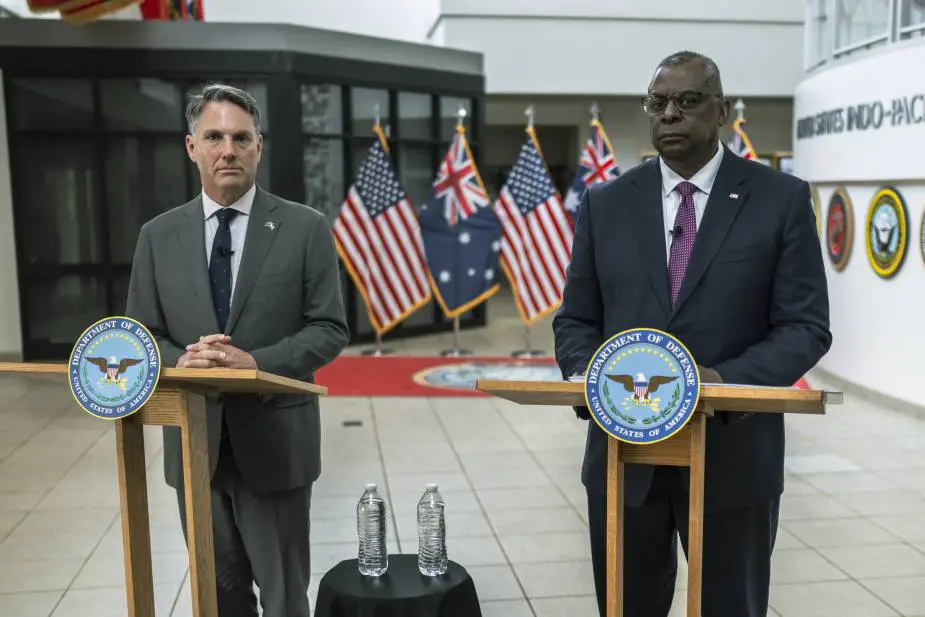US Secretary of Defense Austin's 8th trip to Indo-Pacific Region: Unbreakable Alliance between the US and Australia has never been stronger
On July 29, 2023, U.S. Secretary of Defense Lloyd J. Austin, Secretary of State Antony Blinken, and their Australian counterparts, Deputy Prime Minister Richard Marles and Minister of Foreign Affairs and Trade Penny Wong, met in Brisbane, Australia for the 33rd Australia-U.S. Ministerial Consultations (AUSMIN).
Follow Army Recognition on Google News at this link

U.S. Secretary of Defense Lloyd J. Austin III and Australian Deputy Prime Minister and Defense Minister Richard Marles at U.S. Indo-Pacific headquarters, Camp Smith, Hawaii, Oct. 1, 2022 (Picture source: U.S. DoD/Chad J. McNeeley)
The principals determined that the Unbreakable Alliance between the United States and Australia has never been stronger – and that the Alliance remains a partnership of strategic interest rooted in common values and a common determination to preserve stability, prosperity, and peace. Against the backdrop of historic momentum for the Alliance, the United States and Australia committed to advance a number of key lines of shared effort, including:
Enhanced force posture cooperation
Reaffirming their respect for each other's sovereignty and their commitment to operationalize the Alliance, the United States and Australia advanced key priorities across an ambitious range of force posture cooperation efforts, including:
• Continuing to progress upgrades at key Australian bases in the north, including RAAF Bases Darwin and Tindal.
• Scoping additional upgrades at new locations, RAAF Bases Scherger and RAAF Curtin.
• Conducting more regular and longer expeditionary visits of U.S. submarines to Australia starting this year, with a focus on HMAS Stirling, as Australia prepares for Submarine Rotational Force-West, an important milestone for the AUKUS Optimal Pathway.
• Enabling a regular rotation of the U.S. Army Watercraft in Australia, starting with participation in Exercise Talisman Sabre.
• Reaffirming their commitment to deliver the ambitious trajectory of Enhanced Force Posture Cooperation across land, maritime, and air domains, as well as the Combined Logistics, Sustainment, and Maintenance Enterprise.
• Through Enhanced Air Cooperation, rotating U.S. Navy Maritime Patrol and Reconnaissance Aircraft to Australia to enhance regional maritime domain awareness, with a goal of inviting like-minded partners to participate.
• Establishing an interim location at Albury-Wodonga (Bandiana) for the Combined Logistics, Sustainment, and Maintenance Enterprise as a precursor to an enduring Logistics Support Area in Queensland.
• Stating their intent to declare Enhanced Space Cooperation as a new Force Posture Initiative, which would enable increased space integration and cooperation under the U.S.-Australia Force Posture Agreement, as well as stating their intent to increase space integration and cooperation in existing operations and exercises.
Capability development and defense industrial base cooperation
Reaffirming the importance of maximizing the strategic and technological advantage of the Alliance in an age of heightened strategic competition, the United States and Australia advanced a number of key priorities to strengthen their advanced capabilities and the health of their defense industrial bases, including:
• Committing to collaborating on critical technologies and innovation to ensure the Alliance's asymmetrical capability edge and to explore opportunities for regional co-development, co-production, and co-sustainment aligned to agreed capability priorities.
• Agreeing to advance cooperation on Australia's Guided Weapons and Explosive Ordnance (GWEO) Enterprise by entering into an arrangement to collaborate on a flexible guided weapons production and maintenance capability in Australia, with an initial focus on the co-production of Guided Multiple Launch Rocket Systems by 2025.
- The United States also announced its intent to pursue reforms to the regulations governing the transfer of guided weapons to Australia with the aim of accelerating delivery, transferring technical data for the M795 155mm artillery shell in support of future production in Australia, and identifying opportunities for Australian industry to address constraints in the U.S. industrial base.
- The principals reaffirmed their commitment to progress the maintenance, repair, overhaul, and upgrade of priority munitions in Australia, with an initial focus on MK-48 heavyweight torpedoes and SM-2 missiles.
• Welcoming progress under the AUKUS partnership toward Australia's acquisition of a conventionally armed, nuclear-powered submarine capability and the development of advanced capabilities to safeguard stability and security in the Indo-Pacific. They reaffirmed their commitment to transparency and urged others to take a similar approach to their capability development.
Regional security integration
Committing to uphold a global order based on international law, including the fundamental principles of sovereignty and territorial integrity, the United States and Australia advanced a number of key priorities to strengthen their mutual alliances, partnerships, and trilateral and multilateral security arrangements, including:
• Announcing their intent to develop concrete proposals with Japan for trilateral cooperation that will increasingly invite Japanese participation in exercises and training-related activities in Australia, including F-35 cooperation.
• Agreeing to enhance trilateral integrated air and missile defense (IAMD) cooperation with Japan.
• Exploring opportunities to opportunities to further deepen cooperation with partners, including Japan, India, Indonesia, the Philippines, and the Republic of Korea, noting the dividend for security and stability in the Indo-Pacific.
• Committing to leverage – in consultation with Pacific Island countries – the planned deployment of a USCG Cutter to the Pacific in early 2024 to further maritime domain awareness and training in the region to address maritime security priorities including illegal, unreported, and unregulated (IUU) fishing.
• Reaffirming their commitment to enhance interoperability with the militaries of the Pacific through a range of exercises. The principals also welcomed Fiji, Indonesia, Papua New Guinea, and Tonga's participation in Exercise Talisman Sabre 2023 for the first time, as well as India, Singapore, Thailand, and the Philippines as inaugural observers.
Defense News July 2023


























